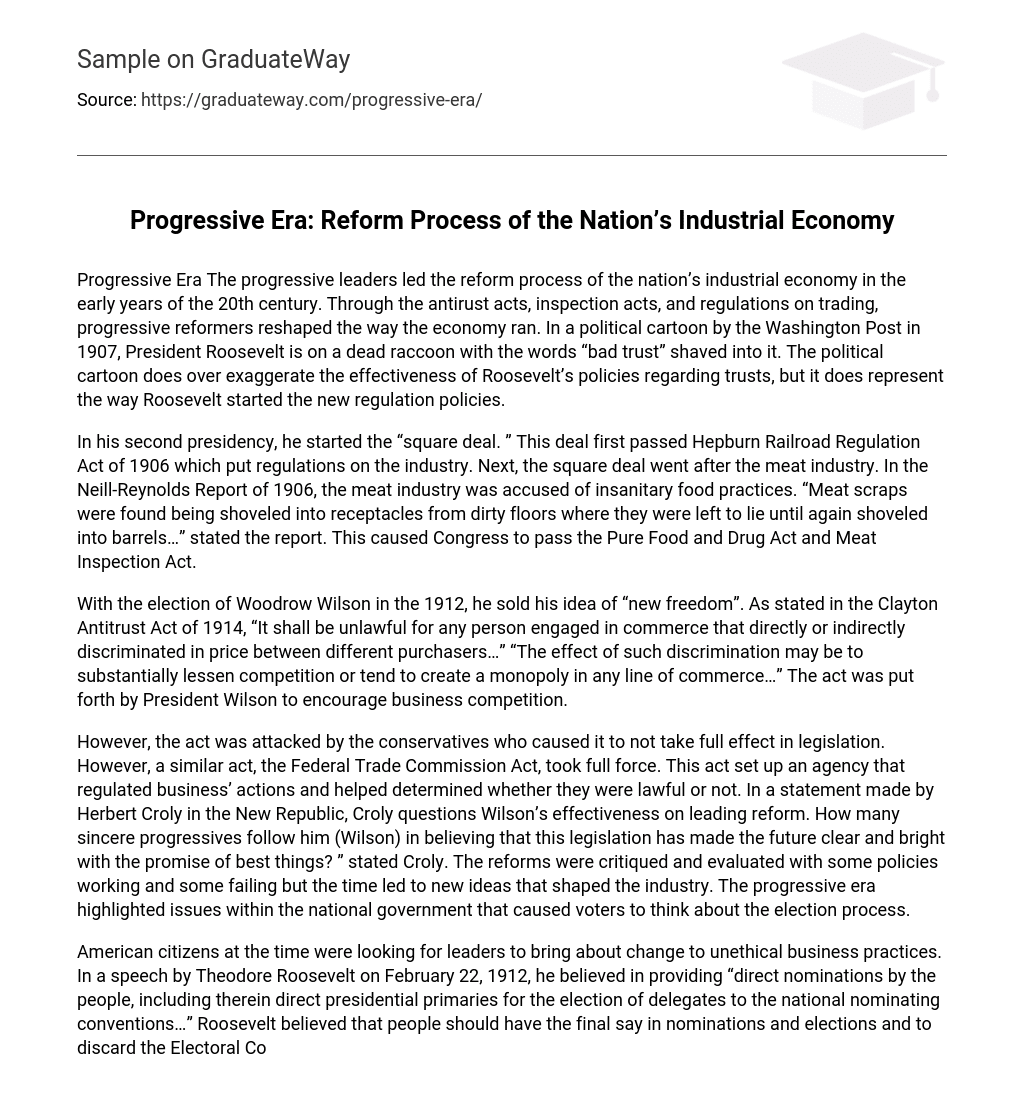Progressive Era The progressive leaders led the reform process of the nation’s industrial economy in the early years of the 20th century. Through the antirust acts, inspection acts, and regulations on trading, progressive reformers reshaped the way the economy ran. In a political cartoon by the Washington Post in 1907, President Roosevelt is on a dead raccoon with the words “bad trust” shaved into it. The political cartoon does over exaggerate the effectiveness of Roosevelt’s policies regarding trusts, but it does represent the way Roosevelt started the new regulation policies.
In his second presidency, he started the “square deal. ” This deal first passed Hepburn Railroad Regulation Act of 1906 which put regulations on the industry. Next, the square deal went after the meat industry. In the Neill-Reynolds Report of 1906, the meat industry was accused of insanitary food practices. “Meat scraps were found being shoveled into receptacles from dirty floors where they were left to lie until again shoveled into barrels…” stated the report. This caused Congress to pass the Pure Food and Drug Act and Meat Inspection Act.
With the election of Woodrow Wilson in the 1912, he sold his idea of “new freedom”. As stated in the Clayton Antitrust Act of 1914, “It shall be unlawful for any person engaged in commerce that directly or indirectly discriminated in price between different purchasers…” “The effect of such discrimination may be to substantially lessen competition or tend to create a monopoly in any line of commerce…” The act was put forth by President Wilson to encourage business competition.
However, the act was attacked by the conservatives who caused it to not take full effect in legislation. However, a similar act, the Federal Trade Commission Act, took full force. This act set up an agency that regulated business’ actions and helped determined whether they were lawful or not. In a statement made by Herbert Croly in the New Republic, Croly questions Wilson’s effectiveness on leading reform. How many sincere progressives follow him (Wilson) in believing that this legislation has made the future clear and bright with the promise of best things? ” stated Croly. The reforms were critiqued and evaluated with some policies working and some failing but the time led to new ideas that shaped the industry. The progressive era highlighted issues within the national government that caused voters to think about the election process.
American citizens at the time were looking for leaders to bring about change to unethical business practices. In a speech by Theodore Roosevelt on February 22, 1912, he believed in providing “direct nominations by the people, including therein direct presidential primaries for the election of delegates to the national nominating conventions…” Roosevelt believed that people should have the final say in nominations and elections and to discard the Electoral College because it was an “indirect vote through an untrammeled Electoral College. However, these ideas were never put into place even though they came from an influential progressive of the time. In the voting numbers of presidential elections from 1900 through 1920, the numbers show a slight drop in the percentages of eligible voters who voted in each election. The poll shows that the eligible voters of the early 20th century were not involved in the country’s voting process at the time. Presidential candidates failed to unite party ideals and were too busy focusing on winning the election.
In the first term of Roosevelt’s presidency, he was not concerned with reform but winning over voters for reelection in the 1904 campaign. One my come to think that maybe that if Roosevelt’s idea of reorganizing the political process the way he explained in his speech in 1912, the percent of eligible voters casting votes would have not dropped off so much by 1920. These documents both stated the need for political reform with the progressive ideals of Roosevelt and the lowering percentages in each election.
However, the progressives failed to unite the party’s ideas for reform in the politics of the early 20th century. The antitrust policies, industry regulations, and inspections acts found its way into the books of legislation and made major reforms regarding the way business conducted themselves in commerce. However, the progressive era failed to unite ideas into one major progressive party which led to the decrease in citizen involvement in politics of the early 20th century.
In addition, the progressives failed to enact any major policies besides the Women Suffrage Act that would help the social status of women, African Americans, or children in factoires. Overall, the progressive era was successful in changing the way American Industry worked but fell short of making any large reforms for the social standings of certain Americans and the political policies.





